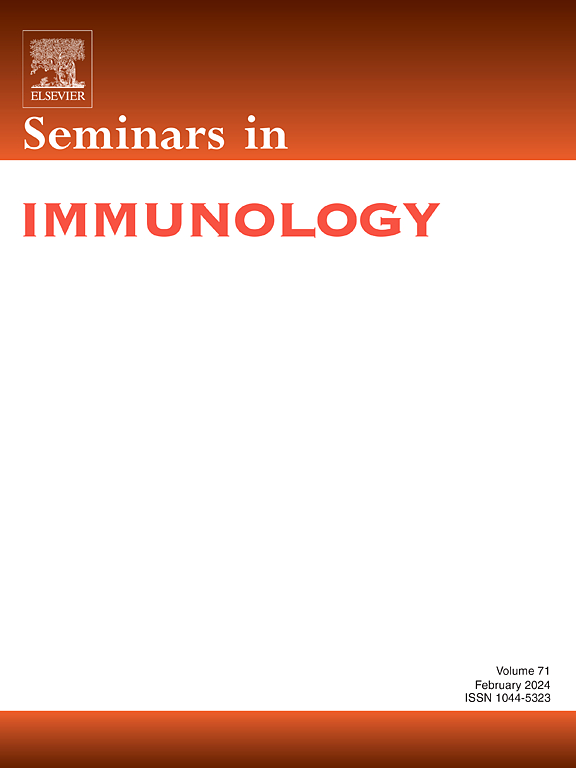利用补体生物标志物进行精准癌症治疗
IF 7.4
2区 医学
Q1 IMMUNOLOGY
引用次数: 0
摘要
肿瘤微环境(tumor microenvironment, TME)由多种免疫和非免疫细胞以及来自不同来源的蛋白质组成,在肿瘤的发展、治疗反应和患者预后中起着至关重要的作用。补体系统在TME中起着关键作用。它是一种蛋白水解级联反应,产生的裂解片段能够通过特定受体激活细胞或沉积在细胞和组织上。本文综述了补体系统作为癌症潜在生物标志物的最新研究数据。转录组学分析已经根据补体基因表达对预后的影响对肿瘤进行了分类。免疫染色提供了对肿瘤和TME细胞中补体蛋白和片段的表达和沉积的见解。在血液等体液中,测量补体激活片段和检测抗补体自身抗体已经确定了与某些癌症类型相关的非侵入性生物标志物。随着补体靶向治疗的兴起以及分析肿瘤和体液中补体系统的新工具的出现,是时候确定其在癌症治疗中的作用了。这包括它在癌症检测、分期和治疗监测方面的潜力。本文章由计算机程序翻译,如有差异,请以英文原文为准。
Harnessing complement biomarkers for precision cancer care
The tumor microenvironment (TME) consists of various immune and non-immune cells, along with proteins from different origins, and plays a crucial role in tumor development, treatment response, and patient prognosis. Complement system is a key player in the TME. It is a proteolytic cascade that generates cleavage fragments capable to activate cells through specific receptors or deposit on cells and tissues. This review summarizes current data on the complement system as a potential biomarker in cancer. Transcriptomic analyses have classified tumors based on the impact of complement gene expression on prognosis. Immunostaining provides insights into the expression and deposition of complement proteins and fragments in tumors and TME cells. In body fluids such as blood, measuring complement activation fragments and detecting anti-complement autoantibodies have identified non-invasive biomarkers relevant to certain cancer types. With the rise of complement-targeting therapies and new tools for analyzing the complement system in tumors and body fluids, it is time to define its role in cancer management. This includes its potential for cancer detection, staging, and potentially for treatment monitoring.
求助全文
通过发布文献求助,成功后即可免费获取论文全文。
去求助
来源期刊

Seminars in Immunology
医学-免疫学
CiteScore
11.40
自引率
1.30%
发文量
50
审稿时长
89 days
期刊介绍:
Seminars in Immunology is a specialized review journal that serves as a valuable resource for scientists in the field of immunology. The journal's approach is thematic, with each issue dedicated to a specific topic of significant interest to immunologists. It covers a wide range of research areas, from the molecular and cellular foundations of the immune response to the potential for its manipulation, highlighting recent advancements in these areas.
Each thematic issue is curated by a guest editor, who is recognized as an expert in the field internationally. The content of each issue typically includes six to eight authoritative invited reviews, which delve into various aspects of the chosen topic. The goal of these reviews is to provide a comprehensive, coherent, and engaging overview of the subject matter, ensuring that the information is presented in a timely manner to maintain its relevance.
The journal's commitment to quality and timeliness is further supported by its inclusion in the Scopus database, which is a leading abstract and citation database of peer-reviewed literature. Being indexed in Scopus helps to ensure that the journal's content is accessible to a broad audience of researchers and professionals in immunology and related fields.
 求助内容:
求助内容: 应助结果提醒方式:
应助结果提醒方式:


